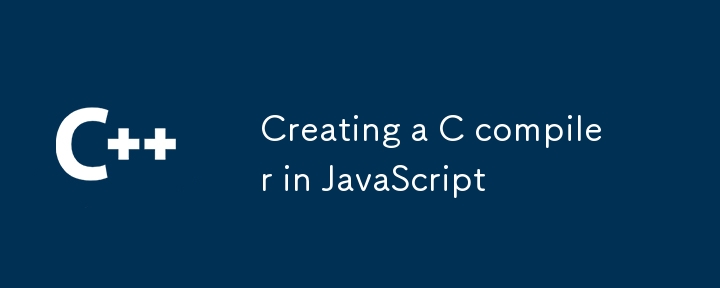在 JavaScript 中建立 C 編譯器
- PHPz原創
- 2024-07-18 01:42:311250瀏覽

在 JavaScript 中建立 C 編譯器是一個複雜而雄心勃勃的項目,涉及多個元件,包括詞法分析、解析、語義分析和程式碼生成。下面是一個簡化的進階範例,說明如何開始建立這樣的編譯器。本範例將重點放在詞法分析(標記化)和解析階段,這是編譯 C 程式碼的第一步。
第 1 步:詞法分析(標記化)
詞法分析器(lexer)將輸入的 C 代碼轉換為標記流。
class Lexer {
constructor(input) {
this.input = input;
this.tokens = [];
this.current = 0;
}
tokenize() {
while (this.current < this.input.length) {
let char = this.input[this.current];
if (/\s/.test(char)) {
this.current++;
continue;
}
if (/[a-zA-Z_]/.test(char)) {
let start = this.current;
while (/[a-zA-Z0-9_]/.test(this.input[this.current])) {
this.current++;
}
this.tokens.push({ type: 'IDENTIFIER', value: this.input.slice(start, this.current) });
continue;
}
if (/[0-9]/.test(char)) {
let start = this.current;
while (/[0-9]/.test(this.input[this.current])) {
this.current++;
}
this.tokens.push({ type: 'NUMBER', value: this.input.slice(start, this.current) });
continue;
}
switch (char) {
case '+':
this.tokens.push({ type: 'PLUS', value: '+' });
this.current++;
break;
case '-':
this.tokens.push({ type: 'MINUS', value: '-' });
this.current++;
break;
case '*':
this.tokens.push({ type: 'STAR', value: '*' });
this.current++;
break;
case '/':
this.tokens.push({ type: 'SLASH', value: '/' });
this.current++;
break;
case '=':
this.tokens.push({ type: 'EQUAL', value: '=' });
this.current++;
break;
case ';':
this.tokens.push({ type: 'SEMICOLON', value: ';' });
this.current++;
break;
case '(':
this.tokens.push({ type: 'LPAREN', value: '(' });
this.current++;
break;
case ')':
this.tokens.push({ type: 'RPAREN', value: ')' });
this.current++;
break;
default:
throw new TypeError('Unexpected character: ' + char);
}
}
return this.tokens;
}
}
第二步:解析
解析器將標記流轉換為抽象語法樹(AST)。
class Parser {
constructor(tokens) {
this.tokens = tokens;
this.current = 0;
}
parse() {
let ast = {
type: 'Program',
body: []
};
while (this.current < this.tokens.length) {
ast.body.push(this.parseStatement());
}
return ast;
}
parseStatement() {
let token = this.tokens[this.current];
if (token.type === 'IDENTIFIER' && this.tokens[this.current + 1].type === 'EQUAL') {
return this.parseAssignment();
}
throw new TypeError('Unknown statement: ' + token.type);
}
parseAssignment() {
let identifier = this.tokens[this.current];
this.current++; // skip identifier
this.current++; // skip equal sign
let value = this.parseExpression();
this.expect('SEMICOLON');
return {
type: 'Assignment',
identifier: identifier.value,
value: value
};
}
parseExpression() {
let token = this.tokens[this.current];
if (token.type === 'NUMBER') {
this.current++;
return {
type: 'Literal',
value: Number(token.value)
};
}
throw new TypeError('Unknown expression: ' + token.type);
}
expect(type) {
let token = this.tokens[this.current];
if (token.type !== type) {
throw new TypeError('Expected ' + type + ' but found ' + token.type);
}
this.current++;
}
}
第 3 步:程式碼生成
最後,程式碼產生器將 AST 轉換為目標語言,可以是 JavaScript 或任何其他語言。
class CodeGenerator {
generate(node) {
switch (node.type) {
case 'Program':
return node.body.map(statement => this.generate(statement)).join('\n');
case 'Assignment':
return `let ${node.identifier} = ${this.generate(node.value)};`;
case 'Literal':
return node.value;
default:
throw new TypeError('Unknown node type: ' + node.type);
}
}
}
把它們放在一起
以下是如何使用詞法分析器、解析器和程式碼產生器:
const input = `x = 42;`;
const lexer = new Lexer(input);
const tokens = lexer.tokenize();
console.log('Tokens:', tokens);
const parser = new Parser(tokens);
const ast = parser.parse();
console.log('AST:', JSON.stringify(ast, null, 2));
const generator = new CodeGenerator();
const output = generator.generate(ast);
console.log('Output:', output);
這會將輸入標記化,將其解析為 AST,並從 AST 產生 JavaScript 程式碼。
筆記
這個範例高度簡化,只處理 C 語言的一小部分。成熟的 C 編譯器需要處理更大的標記集,解析複雜的表達式、語句、宣告、型別,並產生更複雜的程式碼。
以上是在 JavaScript 中建立 C 編譯器的詳細內容。更多資訊請關注PHP中文網其他相關文章!
陳述:
本文內容由網友自願投稿,版權歸原作者所有。本站不承擔相應的法律責任。如發現涉嫌抄襲或侵權的內容,請聯絡admin@php.cn

